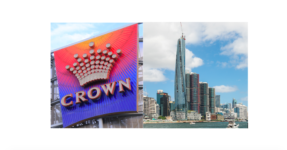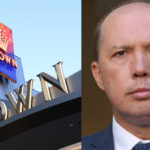Anti-Money Laundering and Counter-Terrorism Financing Laws in Australia

Crown Resorts won’t be able to open its brand new casino at Barangaroo as planned next month, until a review of its gambling licence is complete.
The New South Wales gambling regulator, the Independent Liquor and Gaming Authority (ILGA) has confirmed that an investigation into Crown Resorts is still underway and the new casino will not be able to be open until that investigation is complete and Crown’s licence is reviewed in the wake of the investigation’s findings.
The decision came after the Bergin Inquiry, heard an admission earlier this week from Crown Resort’s legal team that it was likely criminals used two of its bank accounts to launder money.
The Bergin inquiry was established by the Independent Liquor and Gaming Authority (ILGA) last year, after allegations of suspicious transactions and potential money laundering were reported in the mainstream media.
The Inquiry was set up under section 143 of the Casino Control Act 1992 (NSW) and is being conducted by former judge of the NSW Supreme Court, Patricia Bergin SC.
Crown does an abrupt ‘about face’
While Crown had initially urged Commissioner Bergin against finding that its bank accounts had been used for money laundering, two independent reviews of its accounts suggest otherwise, forcing the Crown to reverse its position.
Lawyers for the Crown told the Bergin Inquiry that “Crown accepts that there were funds deposited into the Riverbank and Southbank accounts that has found to be indicative of ‘cuckoo smurfing’ – it is indicative of a form of money laundering.”
“Crown accepts that an inference can be drawn that at some point in time, deposits into the Southbank and Riverbank accounts were more probable than not, part of cuckoo smurfing.”
Cuckoo smurfing is a money laundering technique whereby criminals split large transactions into smaller transactions to avoid detection.
The Southbank and Riverbank accounts which are set up for patrons to deposit money for use at Crown’s Melbourne and Perth casinos have become a major focus of the inquiry which has heard that ANZ bank closed the accounts in 2014 after they were used for a series of cash deposits indicative of money laundering.
Crown did not review the suspicious transactions, but proceeded to open new accounts with the Commonwealth Bank. CBA shut the new accounts last year after they were also used for a string of suspicious cash transactions.
Crown’s failure to stop money laundering at its Melbourne and Perth casinos is one reason why it is considered unfit to keep the licence for its new $2.2 billion Sydney casino. The IGLA has therefore suspended the opening of the Barangaroo casino until at least February 2021.
ACLEI investigation
The Australian Commission for Law Enforcement Integrity (ACLEI), is also investigating the Crown Resorts VIP high-roller programme, amid concerns that some interactions between Crown and the Department of Home Affairs ‘raise issues of corruption.’
Late last year the Morrison government referred allegations to the ACLEI following information published by mainstream media including The Age, Sydney Morning Herald and 60 Minutes that Crown Resorts had partnered with tour companies backed by organised crime syndicates implicated in drug running, money laundering and human trafficking, in order to attract wealthy Chinese gamblers.
Links to the Department of Home Affairs
Leaked emails also suggested that Australian visa and consulate officials in China often fast-tracked visas for wealthy gamblers to come to Crown venues in Melbourne and Perth, despite some posing potential security risks or being persons of interest to law enforcement.
What happens next?
It is entirely possible that the findings of these investigations could be handed to police who may choose to investigate further and prosecute individuals involved.
Crown has a 99-year licence to operate the casino. If this licence is revoked then it could be taken over by another operator, or the facility could be repurposed. For now, its future remains uncertain.
Commonwealth laws against money laundering and terrorism financing
The Anti-Money Laundering and Counter-Terrorism Financing Act 2006 (Cth) seeks, among other things, to impose obligations on the financial services industry in order to reduce the ability of individuals and groups to use banking and financial services to engage in criminal activity.
The Act prescribes a range of procedures which financial services companies are required to follow to achieve this objective; from rules relating to the identification of customers, to disclosure obligations, ongoing due diligence, reporting obligations and the keeping of records.
It also contains a range of provisions relating to the administration of the rules set down by the Act; including the function, composition and powers of the regulatory body AUSTRAC.
The laws contained in the Act are enforceable a range of criminal offences – many of which are contained in Part 12. These offences are:
- Section 136: Producing false or misleading information (maximum penalty 10 years in prison),
- Section 137: Producing false or misleading documents (max penalty 10 years),
- Section 138: Producing false documents (max penalty 10 years),
- Section 139: Providing a designated service using a false customer name or customer anonymity (max penalty 2 years),
- Section 140: Receiving a designated service using a false customer name or customer anonymity (max penalty 2 years),
- Section 141: Customer commonly known by 2 or more different names – disclosure to reporting entity (max penalty 2 years),
- Section 142: Conducting transactions so as to avoid reporting requirements relating to threshold transactions (max penalty 5 years), and
- Section 143: Conducting transfers so as to avoid reporting requirements relating to cross-border movements of physical currency (max penalty 5 years).
It is important to bear in mind that the prosecution must prove each element (or ingredient) of the charged offence beyond reasonable doubt before a person can be found guilty.
The Act also prescribes a range of civil penalties which apply to the contravention of its provisions. These are contained in Division 2 of Part 15 (sections 174 to 183).
And Division 3 of Part 15 (sections 184 to 189) empowers enforcement bodies to exercise their discretion to issue infringement notices for a range of breaches. These sections are normally applied in relation to less serious breaches of the Act.
Facing a corporate crime or compliance issue?
If you have been accused of a breach of regulations or an offence and would like to seek advice from a lawyer with specialist experience in corporate crime and compliance, call Sydney Criminal Lawyers anytime on (02) 9261 8881 to arrange a conference at one of our offices, which are located in the Sydney CBD and across the Sydney metropolitan area including Parramatta and Liverpool.








